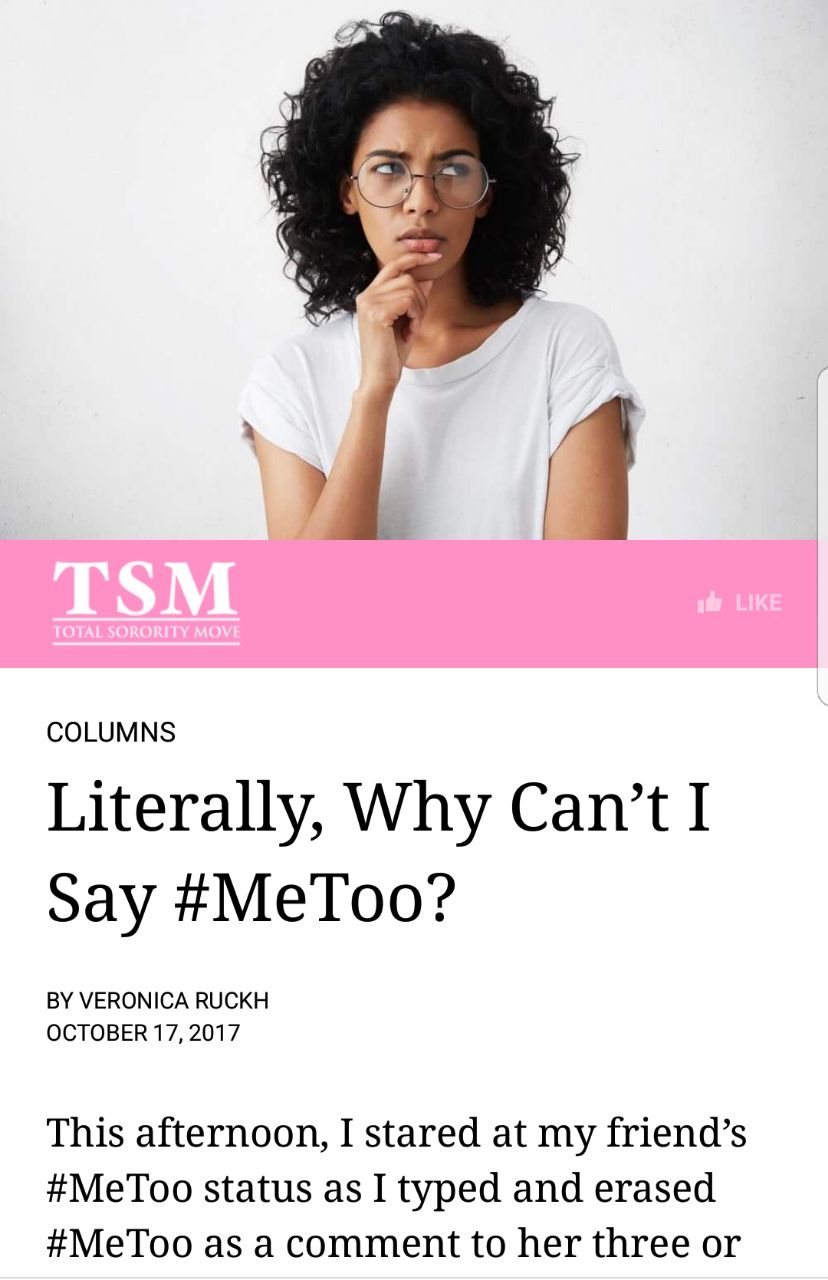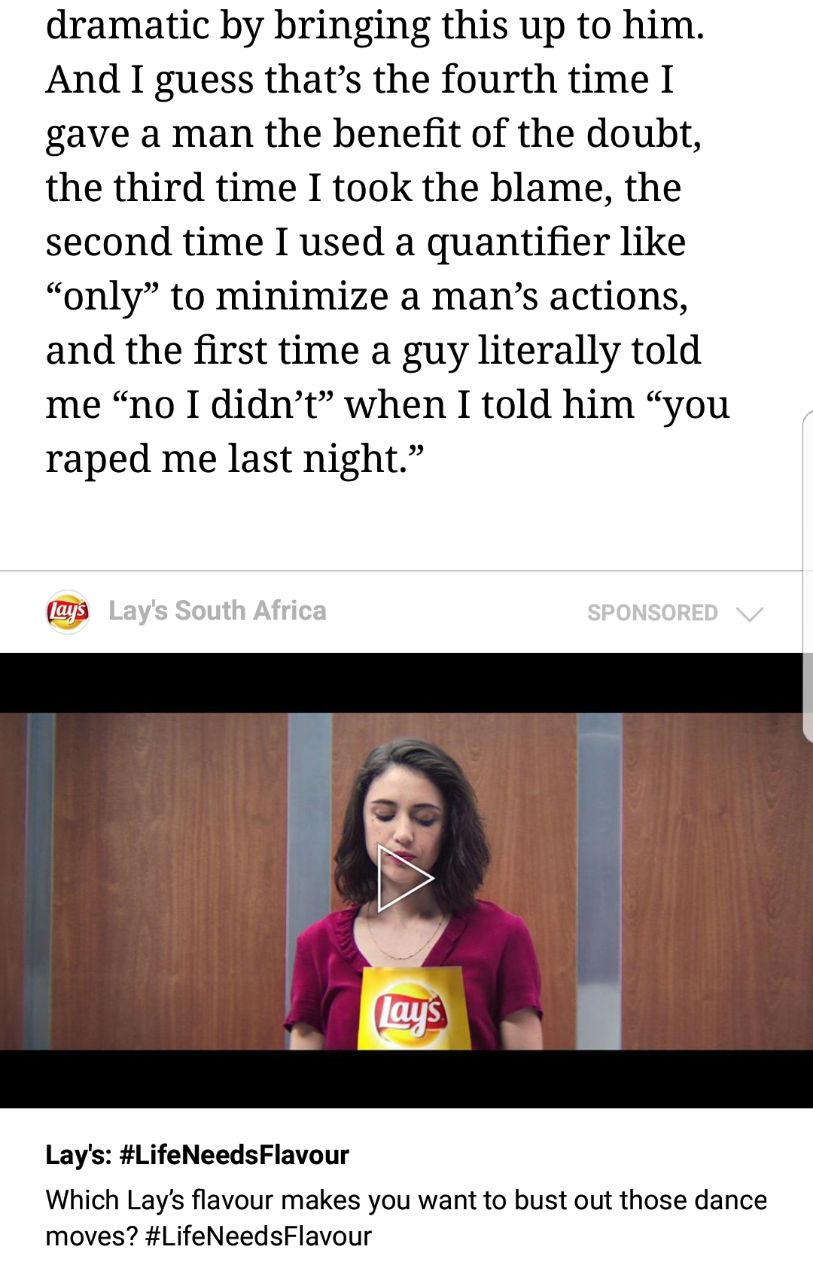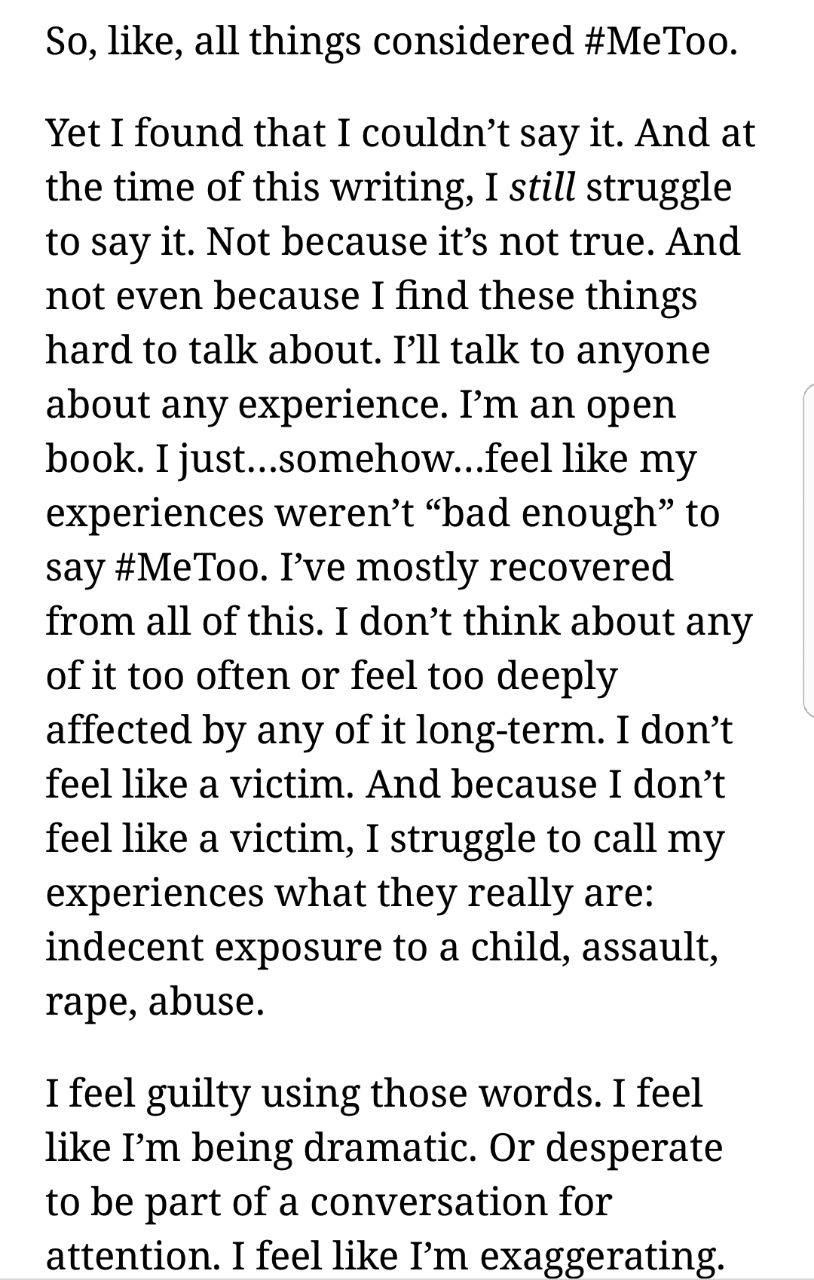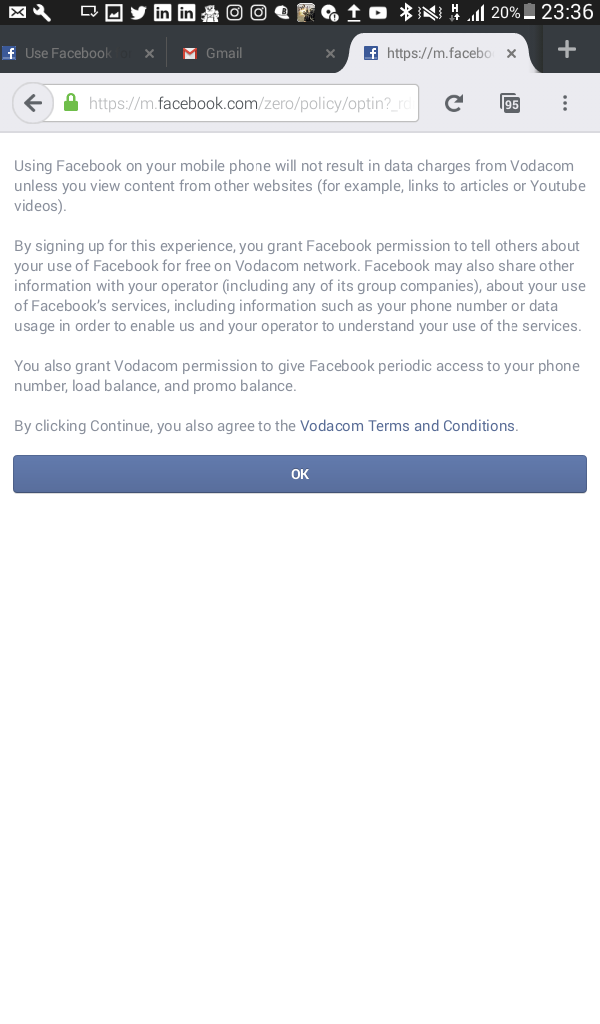No matter what you are selling, let the brand be the discerning factor in people’s purchasing decisions. Sales does not mean; “lose the brand”. In everything that you do, including sales, even at point-of-sale, let the brand be the champion.
Is Programmatic advertising problematic? (#MeToo)
Can I read about rape, and laugh in the same breath?
In the wake of the #MeToo conversation, our digital and more specifically, social media platforms have been abuzz with links, status updates, comments, and multiple shares with women finally garnering the courage to share their ordeal of violence and sexual abuse.
As society, we’ve both consciously and otherwise known that rape in our society has been vile, but in the recent period, never has it become so starkingly apparent that perhaps, rape is one of the biggest human challenges of all time. It is incredibly disturbing that almost every woman has a story to tell, and the most critical thing is that not all of the women do get the opportunity to tell their stories. Communication is critical therefore when women do get to tell their stories, particularly with regards to the #MeToo conversation, do we need advertising messaging in between? I don’t think so.
rape is one of the biggest human challenges of all time
This article is not necessarily about #MeToo, but rather advertising during this time whilst all of this is happening.
As I was reading this article about how difficult it is for women to speak about the experiences of violence and sexual abuse, perhaps even more interesting is that before victims can even decide to speak, they have internal battles as to whether the men in question are in actual fact doing anything wrong. This by default, gives the perpetrators the benefit of doubt.
Whilst reading such heart wrenching articles, one is hit by programmatic advertising. These are sometimes ads that have humor in them, and they intentionally aim to bring lightness and laughter. Now, if one is reading an article about rape, and comes across an ad that’s funny, what must happen?
Below are screenshots of excerpts of the aforementioned article where two brands ended up advertising, not by human choice, but rather through an automated algorithm that saw it fit for the ads to appear in the article.




Whilst programmatic advertising is underpinned on the desired or identified target audiences’ demographics, interests and identified platforms, perhaps we should think about the content as well. No? Perhaps identified publishers will once-in-a-while publish serious content like #MeToo, and our ad placement will inevitably fall out of place. Awkward.
I’m conflicted. Does it matter who advertises in an article about rape? Should there even be advertising? It somehow feels like a rude interruption to a serious topic/issue. I suppose this becomes the “noise” that we just scroll over?
I feel that the content of certain articles should not be bombarded with advertising that inevitably dilutes the impact therein. Rape is a serious issue/topic and readers should not be interrupted, more so, the author, the person sharing their story should not be interrupted with adverts that almost make it seem as though the story isn’t that serious nor important.
Or am I reading too much into it? Perhaps we really need to think about where exactly our ads will end up. Should marketers, brands, agencies and social media people be concerned and conscious about where their programmatic adverts will unintentionally land?
Whilst the ads are programmatic and perhaps advertisers don’t really have complete control of the automatically chosen media, is there a way to mitigate against adverts popping up on pages or platforms that may dilute their messaging?
As Advertisers, what is our responsibility when it comes to programmatic advertising?
Do we need to be thinking deeper about where exactly our ads will land?
Should we be thinking about pages or platforms where our brands shouldn’t be?
Is this even a topic worth talking about?
I’d love to hear your thoughts.
PS: N.B.: Kulula & Lay’s are not targeted or meant to be appear insensitive, they appeared in the story as I was reading it, and the ads that you see may be different to the two brands, because of programmatic advertising.
Advertising: Retainers aren’t enough
‘Retainers’ aren’t enough to secure relationships. Most agencies think that having one with a client is in itself is a signifier of a strong relationship, but it isn’t. Retainers just mean secured income for a specific period; they don’t mean that clients are tied down to your agency.
How intimate are you with your client?
Remember, you are not the only pursuer; clients are constantly and consistently being approached by other suppliers. If you and your client aren’t intimate, just transactional, you’ll inevitably lose. Whether your client is retainer or project-based, you have to keep pursuing your client by showing interest at all times.
In today’s commoditised world of creativity, your biggest asset, value proposition or differentiator is not the latest technology, but affection — how intimate are you with your client?
Adapted from original article: here
“Free” = You are for sale (Free Facebook, or not)
Indeed we have sold ourselves. Now Facebook knows you and me better, and Vodacom has access to that information. And they can sell it to third-party companies who can and will serve you with ads.
I’ve been receiving ads from companies I have never interacted with these past few weeks. How do we explain that?
“Either you are being sold a product (or service) or you yourself are the product” – Mogorosi
That line I heard from, Mo and that time, I thought it was the deepest advertising line ever.
If I were to paraphrase his quote, I’d say; “If you are not being sold to, you are being sold to someone else”. But that sounds a tad like a capitalist system and slavery at the same time, doesn’t it?
Have you used Free Facebook yet? Here are the terms and conditions of using free Facebook (see pic below):

The middle paragraph says it all. “By signing up for this experience, you grant Facebook permission to tell others about your use of Facebook for free on Vodacom” – Facebook.
In case you weren’t sure, ‘others’ means companies that advertise on Facebook. Simply put, you have just sold yourself to Facebook, and in return, you get…
View original post 62 more words
5 things to consider to win in digital
Digital marketing is a long-term brand building process
The problem with most brands when it comes to digital: they think of it in campaign formats. Digital is a long-term process #DigitalBranding
In order to win at digital; you need to think of it as a long-term process that requires consistency, persistence, and patience.
How to win at digital (How to think about digital):
- Think of it long-term – it’s a process that will require time to yield results
- The implication therein is to think about consistent type of content that’s true to your brand
- Don’t think of it as a place to do everything (you don’t think of doing everything on TV because it’s expensive, therefore don’t think of doing everything on digital just because it’s cheaper)
- Digital is immediately measurable, but that doesn’t mean results are immediate – you need patience (immediate measurement doesn’t always mean success, sometimes it just means progress – so keep working
- Don’t be too hard on yourself; we are all trying to figure it out – therefore, keep learning to improve and do amazing things (we are all students of digital who will never graduate; not because we are failing, but because the learning never stops. Try new things all the time.
Where is South Africa’s tech industry?
“Free” = You are for sale (Free Facebook, or not)
“Either you are being sold a product (or service) or you yourself are the product” – Mogorosi
That line I heard from, Mo and that time, I thought it was the deepest advertising line ever.
If I were to paraphrase his quote, I’d say; “If you are not being sold to, you are being sold to someone else”. But that sounds a tad like a capitalist system and slavery at the same time, doesn’t it?
Have you used Free Facebook yet? Here are the terms and conditions of using free Facebook (see pic below):

The middle paragraph says it all. “By signing up for this experience, you grant Facebook permission to tell others about your use of Facebook for free on Vodacom” – Facebook.
In case you weren’t sure, ‘others’ means companies that advertise on Facebook. Simply put, you have just sold yourself to Facebook, and in return, you get basic Facebook where you can view posts and comment. The terms and conditions go on further to state that the information you give them will also be accessible to Vodacom and it’s related companies.
But I bet that you knew this when you signed up because as they saying goes; “There’s nothing for mahala”
But Facebook and Vodacom had you at “Free”.
Not all trends matter
It’s as simple as that.
Particularly in a social context. When things seem to be moving in a general direction that seems worth tagging along onto, ask yourself these questions:
- What implication will this trend have on my brand?
- Should I jump on the bandwagon; if yes, why and if no, why not?
- If I do jump onto the bandwagon, what will I be missing out on?
- Is the trend in line with my brand?
- Could it be a fad?
- What am I chasing, hype or substance?
Not every single trend is worth any investment.
Restraint
Simply defined as the measure or condition that keeps something or someone under control, the operative word being control.
The most critical of all types of restraints is self-restraint; the ability to control oneself.
The thing about restraint is that it requires knowledge of self, so regardless of what is happening outside, you are not influenced to go astray. This is critical because if knowledge of self is lacking, anything and everything seems worth doing or following.
The same is true for business or building brands. Outside of business, the world is in a flux, there are many trends to follow. The thing about trends is that they are never ending and always changing, so if you don’t know the essence of your business or brand, you will follow every single trend. On the opposite end, when you know the essence of your business or brand, you will set the trends.
Whilst the idea of following trends may seem inevitable, the truth is, trends come and go, but budgets go easily but never come easily. In the fast-paced world of never ending trends, it is critical to exercise restraint and think about what is it you really desire for your business or brand. Most importantly, restraint will enable you to think about what is right versus what is popular.
What is popular may give you a voice, but it will always be a voice amongst many other voices, and that’s called a choir, and in a choir, we hear everyone, but no single individual.
Is your brand in a choir?
Advertising Trend 2017
Many believe that the advertising industry is one of the primary means through which capitalism continues to thrive. The conduit for businesses to continue taking from society without giving back.
Whilst this may be fact; the truth is that the advertising industry has the power to impact the world in unimaginable ways that can only bring positivity and good social change.
My belief:
I believe that the advertising industry can do so much better. With so much creativity; surely, all of this energy diverted into the right direction and towards the relevant people; the ad industry can affect significant change that is urgently needed.
In South Africa for instance, our country is in urgent need of this creative energy. What is needed is for this robust ball of creative energy to be channeled into the relevant spaces.
Advertising Trend 2017:
The trend for advertising in 2017: ‘doing good for society’. It is time for the advertising industry to demonstrate a concerted effort to ensure that business leaders and companies contribute to the betterment of our society.
I really believe that the industry holds more power to change the status of the country than it will dare to admit. I am not talking CSI nor CSR, but genuine and empathetic giving back through creative expression. Brands and business leaders need to play an active role in the goal to make South Africa the country it should be.
Advertising agencies need to realise that they have the power to both meet shareholder needs and contribute to society. Maybe they do know, but they choose not to contribute positively to society.
It’s only a mindset game.